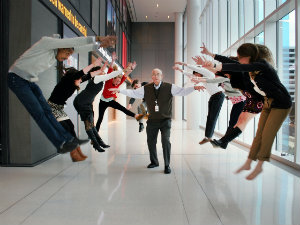 I've been a big fan of National Public Radio (NPR) for many years—occasionally, I still grieve the retirement of Bob Edwards, the longtime newscaster on their morning news program, Morning Edition. And I rejoice that I can still hear former newscaster Carl Kasell’s mellifluous voice on the weekly news quiz show Wait Wait … Don’t Tell Me!
I've been a big fan of National Public Radio (NPR) for many years—occasionally, I still grieve the retirement of Bob Edwards, the longtime newscaster on their morning news program, Morning Edition. And I rejoice that I can still hear former newscaster Carl Kasell’s mellifluous voice on the weekly news quiz show Wait Wait … Don’t Tell Me!
But my fandom is unrelated to the John A. Hartford Foundation's decision to sponsor NPR with our on-air acknowledgements starting this week.
Over the past few years, we've become more serious about trying to communicate about our grantees’ work, raise the profile of aging and health issues, and create a wider reputation for the Hartford Foundation as a high-quality "brand" so that we can lend some of that credibility to grantees and scholars. The last item—our efforts to create a wider reputation for the Foundation--has often been extremely frustrating.
There has been good coverage in a variety of outlets about such great work as Home Hospital and our medical school curricular change project with the Association of American Medical Colleges. And I know the grantees involved have been generous in crediting the support of the Foundation, but our role has almost always been left out, depriving us of some share of reputation (or "brand equity" if you will) that we could use to advance the mission.
You would think that funding from a somewhat mysterious private source like the John A. Hartford Foundation should be part of these stories. Whatever happened to "follow the money?" I've complained to reporters and editors without success. I've also noticed that it doesn't happen to other already well-known foundations—I’ve seen even small projects mentioned tangentially in newspaper stories cited as "funded by The Robert Wood Johnson Foundation."
What we've come to believe is that we are stuck in a chicken-or-egg situation. Since no one knows what or who the John A. Hartford Foundation represents, any reporter mentioning us would be forced to spend paragraphs explaining that we aren't related to the insurance company or the city in Connecticut, even before trying to describe who we actually are. Most decide not to mention the funder and thus we remain stuck in the shadows.
 Former newscaster and current Wait Wait ... Don't Tell Me! host Carl Kasell is an accomplished magician. We're hoping he can help raise awareness of the Hartford Foundation's mission.
Former newscaster and current Wait Wait ... Don't Tell Me! host Carl Kasell is an accomplished magician. We're hoping he can help raise awareness of the Hartford Foundation's mission.So when we learned last year that our West Coast friends at The SCAN Foundation had provided core funding to NPR to establish a "desk" dedicated to aging and long-term care issues and we started hearing their sponsorship acknowledged on the radio (“This program is brought to you by NPR member stations and the SCAN Foundation, supporting aging with dignity and independence”) it all came together. We can directly support coverage of aging issues through NPR, collaborate with one of our funding partners, and develop some brand equity as we go about it. We have since made our own contribution to NPR and for the next several weeks our tagline "working to improve the health of older Americans" should ring out across their news shows.
Combined with our social media "empire"—our Health AGEnda blog , Facebook page, YouTube channel, LinkedIn company page, and Twitter (we hit 2,000 tweets this week!)—and our efforts to earn news coverage through our polling, we want to establish an upward reputational spiral of quality work and recognition.
We don't know if we will become as well-known as the John D. and Catherine T. MacArthur Foundation (“advancing a lush, peaceful, and verdant world”), but we can dream.
